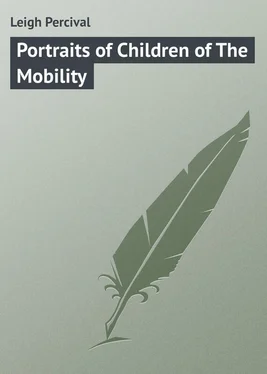Percival Leigh - Portraits of Children of The Mobility
Здесь есть возможность читать онлайн «Percival Leigh - Portraits of Children of The Mobility» — ознакомительный отрывок электронной книги совершенно бесплатно, а после прочтения отрывка купить полную версию. В некоторых случаях можно слушать аудио, скачать через торрент в формате fb2 и присутствует краткое содержание. ISBN: , Жанр: foreign_prose, на английском языке. Описание произведения, (предисловие) а так же отзывы посетителей доступны на портале библиотеки ЛибКат.
- Название:Portraits of Children of The Mobility
- Автор:
- Жанр:
- Год:неизвестен
- ISBN:http://www.gutenberg.org/ebooks/44806
- Рейтинг книги:4 / 5. Голосов: 1
-
Избранное:Добавить в избранное
- Отзывы:
-
Ваша оценка:
- 80
- 1
- 2
- 3
- 4
- 5
Portraits of Children of The Mobility: краткое содержание, описание и аннотация
Предлагаем к чтению аннотацию, описание, краткое содержание или предисловие (зависит от того, что написал сам автор книги «Portraits of Children of The Mobility»). Если вы не нашли необходимую информацию о книге — напишите в комментариях, мы постараемся отыскать её.
Portraits of Children of The Mobility — читать онлайн ознакомительный отрывок
Ниже представлен текст книги, разбитый по страницам. Система сохранения места последней прочитанной страницы, позволяет с удобством читать онлайн бесплатно книгу «Portraits of Children of The Mobility», без необходимости каждый раз заново искать на чём Вы остановились. Поставьте закладку, и сможете в любой момент перейти на страницу, на которой закончили чтение.
Интервал:
Закладка:
There is one dreadful omission in point of dress of which the Mobility are universally guilty, that of going about the streets with their hands naked; an enormity which we hope will soon be put a stop to by law. It is not customary with them to dress for dinner; and although they talk of going sometimes to court , they do not always on such occasions consider it necessary to change their habiliments; notwithstanding which they aspire to a higher honour than that of kissing hands .
The commanding presence, beautiful features, eagle eyes, chiselled lips, aristocratic noses, and silken tresses of the Nobility, are matters of daily observation. In personal appearance the Mobility do not resemble them. Among the lower classes, lusus naturae (a Latin phrase which signifies objects or frights ) are very common. We are inclined to consider these people as a sort of step-children of Nature, who now and then indulges herself in a little jocosity at their expense, for the diversion of the better orders. She gives them funny legs and great hands and feet, she twists their lips about, and makes their eyes converge, with a whimsical look towards the nose, and the latter she turns up in a manner quite ludicrous. In short, to venture a bold expression, she snubs them. We beg, however, to observe, that the Nature who is a step-mother , is what is said to be a second Nature, Use; and that the singularities above mentioned are a kind of heir-looms which the habits of preceding generations have entailed upon their remote posterity. Besides, too many of the Mobility, insensible of the advantages of an agreeable exterior, imprudently venture into chimneys and other places, handle hard and rough substances, and go about in huge heavy boots, from which incautious behaviour their appearance in many respects sustains great detriment.
The use of the Mobility is, to produce food, habitation, and clothing, for the superior classes, and to perform for them those various offices, which, though essential to existence, are not of a dignified quality. Like some of the canine tribes, they are also employed for purposes of defence; for which, with some little drilling and correction, they may be rendered eminently serviceable. During war-time, they are caught and trained for the water; but on the expediency of this proceeding there is some difference of opinion.
The manners of the Mobility are neither sweet nor refined; there is none of the lump-sugar of humanity in them. It is true that one laundress will address another as "Ma'am," and that the driver of a public cabriolet will speak of a locomotive vegetable vender as "that other gentleman;" still people of this description, when they salute one another at all, do so in a very inelegant manner. It is a great pity that they do not take a lesson in this respect from the French, as they would then relinquish their strange practices of nodding and winking, and poking each other in the side. But on points like these we must be brief; a glimpse only of the horrible is always sufficient. Will our readers believe it? the Mobility, in conversation, accuse each other without scruple, in terms not to be mistaken, of wilfully erroneous assertions! and, not content with this, often accompany the insult by a backward movement of the left thumb over the shoulder! But what can be expected of those who smoke pipes of tobacco in the open streets?
The taste of the Mobility is not delicate. As regards aliment, it is one which Louis Eustache Ude never, we are sure, thought of consulting. Their diet is said to include such articles as tripe, cow-heel, (?) &c. if any one knows what those things are. Their literary appetite, that, at least, of those who can read, tends chiefly to certain publications which come out weekly, are mostly sold for the small charge of one penny, and are filled with vituperation of the higher orders. The Mobility are also very fond of "Last Dying Speeches and Confessions;" indeed they regard all information, connected with the administration of the criminal law, with a peculiar interest.
The Mobility have various amusements, most of which are exceedingly low, and which have been in these enlightened times judiciously curtailed by the Legislature. Indeed they can scarcely indulge in any of them without impropriety; for they are supposed, during six days, to be continually occupied, and on the seventh to be enjoying, like the better classes, the sweets of domestic life. Instead of that, they go, on Sundays, to a public-house, provided there may be no pecuniary obstacle to their doing so. There, it is said, they used to play at skittles, bowls, and nine pins ; in lieu of which, those games being now illegal on all but working days, they content themselves with getting inebriated. Occasionally, on evenings during the week, some of them repair to the theatres, where those of our readers who may chance to have honoured the performances with their presence may have heard them, high aloft and far back, in a place allotted to them, making a noise. Their leisure, also, when they have any, is sometimes beguiled by dramatic and musical entertainments, paid for on the voluntary principle, and appropriately performed in the open air. These exhibitions are transferable from place to place; a very fortunate circumstance, as the crowds which collect to view them might otherwise incommode the higher orders, by obstructing their carriages. The Mobility, in certain amusements of theirs, present a curious and humiliating parallel to those of a portion of the Nobility. They are slightly addicted to games of chance, although instead of throwing dice, they usually toss pence, and for rouge et noir, engage in what is termed blind hookey . We could mention some persons who appear to have learned one of these delightful sports from them; we mean, the thimble rig . They are prone, too, in their way, to the pleasures of the field; for instance, the pursuit of the rat, which, although not a noble recreation, like the chase of the fox, is yet a species of hunting. The badger likewise contributes, occasionally, to their fund of harmless enjoyment. They do not, it is true, perform nocturnal gymnastics on knockers and bell-wires, such presumption on their part being severely punishable; but it must be confessed that at an election or an illumination they evince a strong predilection for very similar exploits.
The language of the Mobility is very incorrect in point of grammar, and rather abounds in strong and forcible, than in soft and elegant terms. Perhaps, in treating of the Children of the Mobility more particularly, we shall unavoidably be forced to quote a little of it; but we shall be as chary as a Poor Law Commissioner of what we put into their mouths, recollecting that those introduced by us are intended as companions to the Children of the Nobility. For, as the moralist informs us in the copybook, "Evil communications corrupt good manners."
The Children of the Mobility are distinguished by a remarkable circumstance, at their very birth, from those of the Nobility. The latter are said to enter the world with a certain silver implement in their mouths; at all events, they have one placed there so soon as almost to warrant the idea that it was really bestowed on them by Nature. The former, on the contrary, are endowed with no such thing; and if they were, it would infallibly be transferred, with all possible expedition, to the hands of a particular relative. In short, it would be made a means of procuring the nutriment which a less costly article would serve as effectually to insert.
Further, the Children of the Nobility, justly compared in various poetical effusions to delicate plants and tender flowers, are, with great propriety, reared in a nursery. But the Children of the Mobility, who are the subjects of no effusions but those of indignation at their appetite or their cries, vegetate, many of them, like kitchen stuff, in the open air, and are never grown, if under shelter at all, in any place resembling a hot -house.
Читать дальшеИнтервал:
Закладка:
Похожие книги на «Portraits of Children of The Mobility»
Представляем Вашему вниманию похожие книги на «Portraits of Children of The Mobility» списком для выбора. Мы отобрали схожую по названию и смыслу литературу в надежде предоставить читателям больше вариантов отыскать новые, интересные, ещё непрочитанные произведения.
Обсуждение, отзывы о книге «Portraits of Children of The Mobility» и просто собственные мнения читателей. Оставьте ваши комментарии, напишите, что Вы думаете о произведении, его смысле или главных героях. Укажите что конкретно понравилось, а что нет, и почему Вы так считаете.












